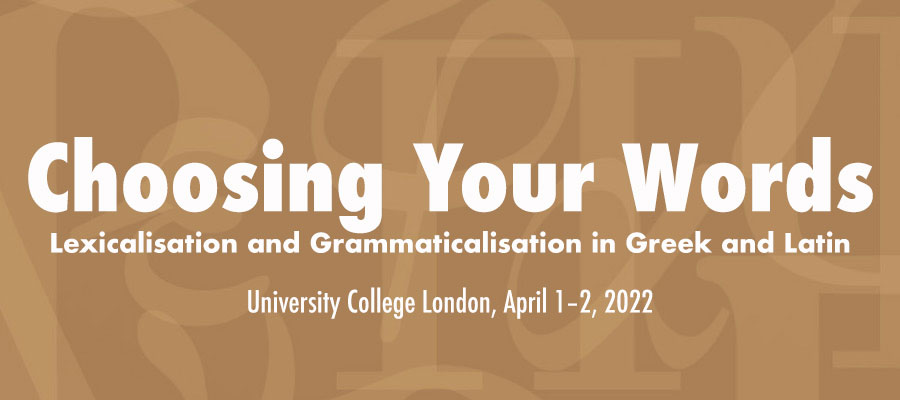Choosing Your Words: Lexicalisation and Grammaticalisation in Greek and Latin, University College London, April 1–2, 2022
The aim of this conference is to examine change in the lexicon and the constructions of Greek and Latin. The lexicon and constructions of languages, thought they have traditionally been viewed as two separate fields of linguistic study, can be understood as continuous entities. The English expression “who knows” can, for instance, function at the same time as an interrogative as well as an adverb, the latter being traditionally represented by a lexeme. A similar situation can be observed in Aristophanes’ ma ton Dia or the Plautine ita me di ament, etc. Examining the variation and evolution of the language of the literary and documentary corpus can help us develop different or more thorough interpretations of these texts.
This continuum between constructions and the lexicon is an area where traditional boundaries between lexicon, morphology, syntax and semantics may be unhelpful in understanding how and why changes occur. This is symptomatic of a more systematic issue with terminology: compounds, for example, are the result of a lexicalisation process by which all of these factors interact with each other. We hope that case studies from the history of Greek and Latin, underpinned by a range of theoretical approaches, will help us to develop better frameworks for the analysis and explanation of linguistic innovation, a field in which current terminological constraints can make it hard to describe the phenomena clearly.
We welcome proposals for papers from established scholars, early career researchers and PhD students.
Topics might include, but are not limited to:
- Lexicon and constructions: can we understand them as separate entities or part of a whole?
- Can we understand and categorise the reasons (language contact, phonological, morphological, semantic, pragmatic...) for innovation and change in the lexicon?
- Motivations for grammatical change: insights from functional, cognitive, pragmatic, discourse approaches, etc.
- How can the reasons behind compounding be explained, and why is it sometimes favoured over other lexicalisation processes?
- The use of classical texts in examining linguistic change and variation.
- The use of theories of linguistic change and variation in interpreting classical texts.
- How cognitive approaches to language and ancient texts can inform our understanding of linguistic change and variation.
The conference will be held at UCL. Online access for participants who cannot travel to London will be also enabled.
